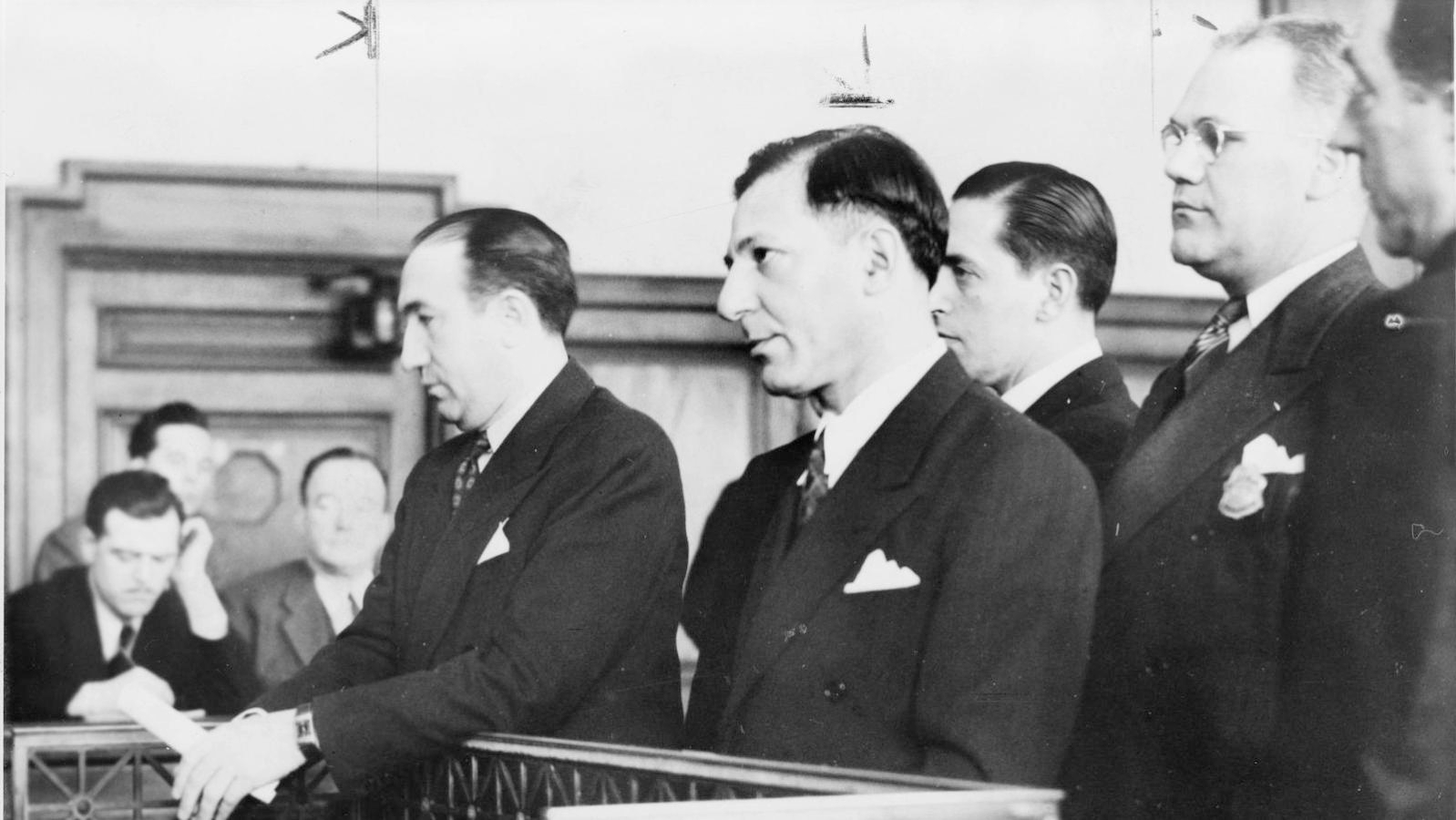Most of our “Chapters in American Jewish History” have related stories about positive Jewish contributions to American life. Like every American ethnic group, however, Jews have produced an occasional villain. The notorious gangster Louis “Lepke” Buchalter was one such figure.
Louis Buchalter was born in 1897 and grew up on the Lower East Side of New York, one of 13 children. His doting mother nicknamed him “Lepkele” and he is known in history simply as Lepke. When his father died in 1909, 12-year-old Lepke was sent to live with his older sister in Williamsburg, Brooklyn. There, he began a career that led him to the highest echelons of American organized crime.
By contrast, Thomas E. Dewey was born in 1902 in Ossowo, Michigan, to a comfortable, middle-class family. His grandfather had been one of the founders of the Republican Party. Bright, energetic, and handsome, Dewey went to Columbia University Law School and remained in New York City, where he became a deputy U. S. Attorney, prosecuting the leadership of Tammany Hall, the corrupt Democratic political machine.
Starting from such different backgrounds, operating at distant ends of the law, the lives–and fates–of Lepke and Dewey would intersect.
With your help, My Jewish Learning can provide endless opportunities for learning, connection and discovery.
Italian and Jewish gangs dominated the Williamsburg area of Brooklyn in which Lepke lived. In this world of small retail shops and light manufacturing, few commercial enterprises were untouched by the strong arm of the gangs, or syndicates, willing to provide “protection” or “insurance” against business disruptions such as strikes, government inspections, arson, vandalism, or direct violence. Of course, the businessmen knew that the mayhem they were being protected from was that which the “insurers” could and would impose themselves if not bought off. Since the police and political leaders were usually silent partners in the protection rackets, shopkeepers and small businessmen had no recourse but to pay. Petty gamblers, prostitutes, pickpockets, and speakeasy operators who worked outside the law had even less power to resist this extortion.
Had syndicated extortion remained focused only on small retail businesses and petty criminals, it would not have become the subject of national notoriety. Nor could Thomas E. Dewey have ridden his relentless pursuit of Lepke to the Republican candidacy for president of the United States in 1944. While today Lepke is not as well remembered as the more-colorful Jewish gangsters Bugsy Siegel, Meyer Lansky, and Dutch Schultz, in his heyday Lepke was “Public Enemy #1.” Historian Albert Fried argues that Lepke’s organization was most effective in bringing “stability” to several unionized industries, most notably the garment trade.
Through there was a threat or actual use of force against employers who lowered prices or employees who struck for “excessive” wages, Lepke’s syndicate assured that the garment industry attained minimal labor disruption, adequate wages, and stable prices and profits for all. Lepke and his organization absorbed a percentage of the businessmen’s profits and union pension funds in exchange for his service. Lepke’s syndicate brought similar stability to trucking, dry cleaning, trash removal and other industries characterized by ease of entry and numerous small competitors. By some estimates, even at the height of the Depression, Lepke and his partner, Jacob Gurrah, were earning $5 million each per year.
Dewey, the descendant of anti-slavery Republicans, found these industrial arrangements no better than slavery itself. As Deputy U.S. Attorney, he used subpoenas, indictments, and the threat of long imprisonment to force cooperation from several of Lepke’s operatives and those who paid him for protection. Lepke’s response was to threaten with death those associates he suspected of disloyalty or inability to withstand Dewey’s pressure. To make his threats credible, Lepke organized a group of henchmen, known as Murder, Inc., who assassinated 14 individuals who, between 1936 and 1939, were seen or were suspected of, talking to Dewey or his agents.
While the murders did deter many from talking, their unintended effect was to raise Dewey’s popularity among outraged Manhattan voters who, in 1938, elected him as district attorney on the Republican ticket despite the fact that registered Democrats dominated the borough. Through a promise of immunity from prosecution, Dewey “turned” one high-ranking Lepke associate, Abe “Kid Twist” Reles, who identified Lepke as having created Murder, Inc. With Reles’s testimony, Dewey and his successor as district attorney, William O’Dwyer (who took over when Dewey was elected governor of New York in 1942), were able to convict Lepke of murder. He was sentenced to die in the electric chair.
Lepke’s sentence was carried out at Sing Sing Prison in 1944. True to the syndicate’s code of honor, he refused to implicate any associates, even though offering to do so might have spared his life. That year, Dewey ran for the presidency against Franklin D. Roosevelt, but the voters were unwilling to change national leaders in the middle of World War II. Four years later, Dewey was the odds-on favorite to defeat the apparently unpopular Harry Truman. No one expected Truman to win —except the voters. The relentless Dewey, who had built a string of successes pursuing Jewish gangsters, lost the election, having gone as far as the politics of crime fighting would take him.
Chapters in American Jewish History are provided by the American Jewish Historical Society, collecting, preserving, fostering scholarship and providing access to the continuity of Jewish life in America for more than 350 years (and counting). Visit www.ajhs.org.



